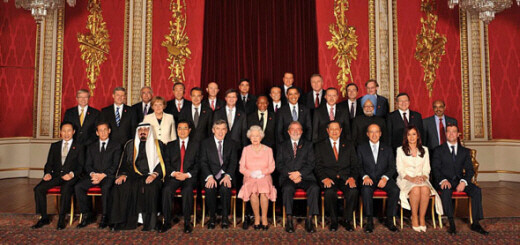hankyoreh
Links to other country sites 다른 나라 사이트 링크
Markets surge following G20 accord

The agreement of the Group of 20 industrialized and emerging economies (G20) reached in their London summit on April 2 (local time) gave a short-lived boost to domestic financial markets. Following a 3.54 percent surge, the stock benchmark KOSPI rose an additional 0.53 percent on Friday and the won, which gained 44.5 won on Thursday, lost 6 won the following day. Experts say the G20 summit announcement could help bolster short-term market sentiments, but how long that impact will last is difficult to determine as there are few detailed action plans coming out of the summit meeting.
The G20 agreed to treble the lending capacity of the International Monetary Fund (IMF) by US750 billion dollars and to permit the IMF to offer emergency loans without strings attached to countries in difficulty. Economists indicate that this agreement could support South Korea's economy, although the government has recently said that it will not be seeking a bailout from the IMF to stabilize its financial markets. “The new loan program resolved many problems that the previous systems had, but a bailout from the IMF still has a ‘stigma’ effect that drives down a nation’s overseas credibility,” a finance ministry official said. “We have sufficient foreign exchange reserves,” the spokesperson added.
Economists suggest both the agreement by the heads of states of the G20 countries to continue expansionary monetary polices and the forecast announced that fiscal spending on stimulus measures will increase to 5 trillion dollars from 2 trillion dollars to address global financial turmoil are further good signs. Expanded fiscal spending could lead to a hike in global demand, which would be a boon to our export-driven economy. Still, some suggest that it is disappointing that the G20 has failed to provide detailed numbers on gross domestic products, making it tough to believe their promises. Other economists are concerned that the announcements coming from the G20 summit are vague at a time when European countries are worried about the worsening fiscal state of their economies.
Lee Jong-woo, a senior researcher at HMC Investment & Securities, said, “They talked about figures such as 1.1 trillion dollars in IMF cash and 5 trillion dollars of stimulus measures but there is no action plan that specifies who will pay the money and how the money will be raised. These are issues which even a central government cannot with deal efficiently.” The accord seems to be comprised mainly of rhetoric, making it difficult to determine whether it can achieve what it promises in the long term.” Oh Suk-tae, an economist at Citibank says, “It will not be easy to see a rebound in macroeconomic indicators and corporate earnings in just a few short months. Exports are also not likely to perk up anytime soon.”
Please direct questions or comments to [englishhani@hani.co.kr]
Editorial・opinion
![[Column] Park Geun-hye déjà vu in Yoon Suk-yeol [Column] Park Geun-hye déjà vu in Yoon Suk-yeol](https://flexible.img.hani.co.kr/flexible/normal/500/300/imgdb/original/2024/0424/651713945113788.jpg) [Column] Park Geun-hye déjà vu in Yoon Suk-yeol
[Column] Park Geun-hye déjà vu in Yoon Suk-yeol![[Editorial] New weight of N. Korea’s nuclear threats makes dialogue all the more urgent [Editorial] New weight of N. Korea’s nuclear threats makes dialogue all the more urgent](https://flexible.img.hani.co.kr/flexible/normal/500/300/imgdb/original/2024/0424/7317139454662664.jpg) [Editorial] New weight of N. Korea’s nuclear threats makes dialogue all the more urgent
[Editorial] New weight of N. Korea’s nuclear threats makes dialogue all the more urgent- [Guest essay] The real reason Korea’s new right wants to dub Rhee a founding father
- [Column] ‘Choson’: Is it time we start referring to N. Korea in its own terms?
- [Editorial] Japan’s rewriting of history with Korea has gone too far
- [Column] The president’s questionable capacity for dialogue
- [Column] Are chaebol firms just pizza pies for families to divvy up as they please?
- [Column] Has Korea, too, crossed the Rubicon on China?
- [Correspondent’s column] In Japan’s alliance with US, echoes of its past alliances with UK
- [Editorial] Does Yoon think the Korean public is wrong?
Most viewed articles
- 1‘We must say no’: Seoul defense chief on Korean, USFK involvement in hypothetical Taiwan crisis
- 2N. Korean delegation’s trip to Iran shows how Pyongyang is leveraging ties with Moscow
- 3‘Weddingflation’ breaks the bank for Korean couples-to-be
- 4Korea sees more deaths than births for 52nd consecutive month in February
- 546% of cases of violence against women in Korea perpetrated by intimate partner, study finds
- 6[Column] Park Geun-hye déjà vu in Yoon Suk-yeol
- 7Will NewJeans end up collateral damage in internal feud at K-pop juggernaut Hybe?
- 8Amnesty notes ‘erosion’ of freedom of expression in Korea in annual human rights report
- 9[Editorial] New weight of N. Korea’s nuclear threats makes dialogue all the more urgent
- 10[Column] Yoon’s first 100 days should open our eyes to pitfalls of presidential system